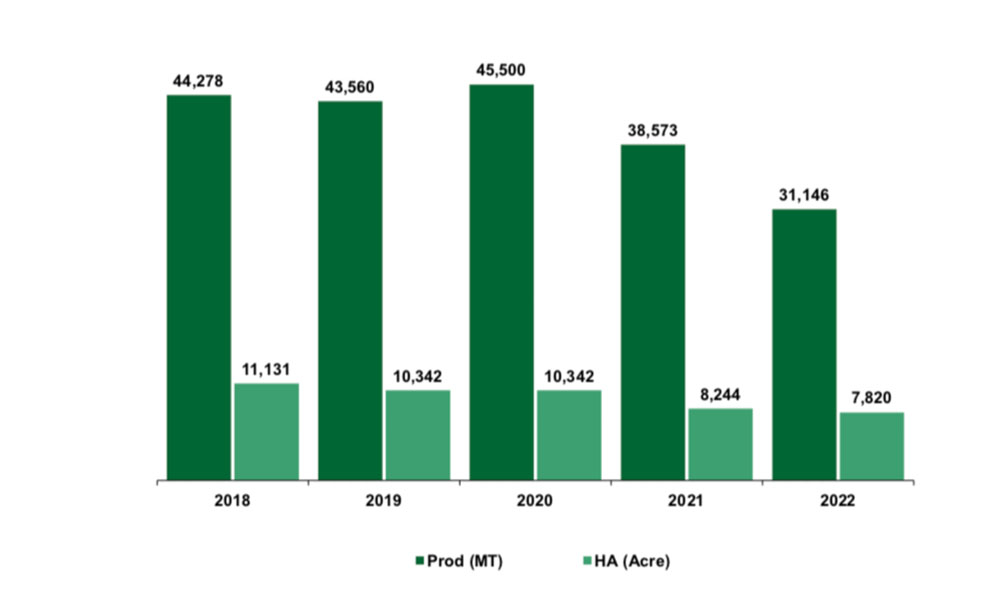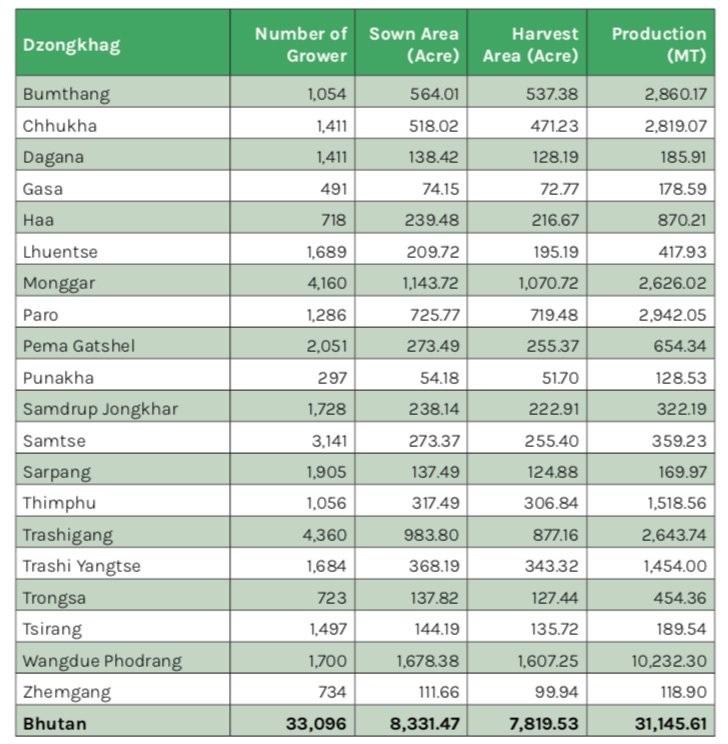… the export and revenue still progressive
YK Poudel
Bhutan has recently experienced a significant drop in potato production, largely attributed to the ageing of potato seeds and their declining quality.
According to the National Centre for Organic Agriculture (NCOA) annual report for 2022-2023, the country produced 31,146 metric tonnes of potatoes in 2022.
This marked a substantial decrease of 7,427 metric tonnes compared to the previous year, constituting a 19 percent decline.
Despite this decline in potato production, Bhutan continues to generate substantial revenue from potato exports.
The Integrated Agriculture and Livestock Survey of Bhutan for 2022 reveals that among root and tuber crops, potatoes remain one of the highest cash crops exported to India, contributing significantly to the income of farming communities.
In 2022, several major potato-producing regions in Bhutan reported lower harvests. Wangdue harvested 10,323 metric tonnes, a reduction of 583 metric tonnes compared to 2021.
Similarly, Paro recorded 2,942 metric tonnes, down by 1,428 metric tonnes from the previous year, while Mongar produced 2,626 metric tonnes, marking a decrease of 1,126 metric tonnes compared to 2021.
Over the five-year period from 2018 to 2022, Bhutan managed to harvest a total of 44,278 metric tonnes of potatoes. However, the number of potato growers in the country declined from 33,737 in 2021 to 33,096 in 2022.
Lobzang, the potato programme officer at NCOA, emphasized the crucial role of potato crops in the livelihoods of farmers in various dzongkhags, including Bumthang, Chukha, Mongar, Trashigang, and Haa.
He noted that potatoes not only serve as a source of income but also indirectly support households by enabling them to purchase cereals and other essential items.
Lobzang said how potato farming in Bhutan has evolved over the decades, transitioning from subsistence farming to a market-oriented production system.
To address the issue of stagnant potato yields, Bhutan has undertaken various initiatives, including the import of climate-resilient potato clones from the International Potato Centre (IPC) in Peru and potato varieties from Nepal.

These efforts have led to the introduction of a potato variety known as Yusi Maap-2 and the evaluation of biofortified (tetraploid) clones in multiple locations in Yusipang and Bumthang, aimed at ensuring the long-term sustainability of the potato industry and achieving food security in Bhutan.
It’s worth noting that Bhutan’s agricultural sector plays a significant role in its economy, with 43.5 percent of the working population engaged in this sector, as indicated in the labour force survey by the National Statistics Bureau (NSB).
Additionally, the NCOA report highlights that Bhutan exceeded its target for new potato seed supply, providing 3,150 kilograms (kg) against a target of 2,800kg. The NCOA also surpassed its seed production target, achieving a remarkable 337.5 percent by producing 20,250kg of potato seeds.
According to the RNR census, approximately twenty-two percent of Bhutanese households rely on potato crops for their livelihood, benefiting around 34,100 households engaged in potato cultivation.

The Department of Agriculture Marketing and Cooperatives (DAMC) reports that recent years have seen significant revenue generation—ngultrum 511.40 million was generated, through the export of 24,439 metric tonnes of potatoes.
Research and development efforts by NCOA have been focused on new potato varieties, contributing to the diversification of potato production in Bhutan.
Notably, potato production in Bhutan primarily occurs within the altitude range of 2,000 to 3,500 meters above sea level. To ensure the quality of produce, a total of 111.77 acres of land and 25 households have been audited and certified under the local organic assurance system.
Bhutan’s agricultural landscape benefits from a collection of approximately 40 biofortified germplasm and 20 climate-resilient potato clones imported from IPC.
Currently, the assessment of four climate-resilient and seven biofortified potato clones is underway in Yusipang, Khangma, and Bumthang, promising a brighter future for Bhutan’s potato industry.


